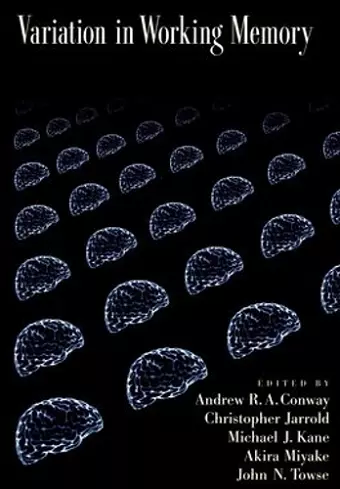Variation in Working Memory
Michael Kane editor Andrew Conway editor Chris Jarrold editor Akira Miyake editor John Towse editor
Format:Paperback
Publisher:Oxford University Press Inc
Published:13th Mar '08
Currently unavailable, and unfortunately no date known when it will be back

This volume explores individual differences in working memory, examining various theories and research from diverse populations. It unifies perspectives on critical questions, offering a comprehensive overview of current approaches to understanding working memory variation.
Variation in Working Memory explores the complexities of working memory, which is essential for holding and manipulating information while engaging in various cognitive tasks. The book emphasizes that working memory capacity can differ significantly among individuals and can evolve throughout a person's life. Understanding these differences is vital, as working memory plays a key role in overall intellectual performance.
The volume presents a thorough and integrative examination of the leading theories related to working memory. It includes contributions from various research groups across the Atlantic, ensuring a diverse range of perspectives. The authors delve into research involving different populations, such as healthy adults, children with learning challenges, older adults, and individuals with neurological disorders. This broad scope allows for a comprehensive understanding of how working memory functions across different demographics.
Each chapter tackles a set of theoretical questions, allowing researchers to articulate their own theories while considering alternative viewpoints. This collaborative approach fosters a dialogue among the various theories, highlighting both their commonalities and distinctions. By providing detailed discussions alongside research summaries, Variation in Working Memory maintains coherence throughout its chapters, offering readers a complete overview of contemporary theoretical and experimental approaches to understanding variations in working memory.
Complex working memory span is able to predict performance on a remarkably wide range of cognitive tasks. This book by a group of outstanding young cognitive psychologists asks the question why? It combines experimental and correlational approaches to provide an excellent state-of-the-art overview of current progress on this important topic. I strongly recommend it to anyone interested in cognitive psychology or individual differences. * Alan Baddeley, Professor of Psychology, University of York *
This book on individual variation in working memory is an excellent collection of chapters by leading investigators, covering key topics in normal adult variation, life span development, and pathology. It appears to be the first collection with this focus on variation in working memory, and it is important for anyone interested in current research on human cognition and brain processes. The book was carefully and insightfully organized and edited by a balanced, very productive team of American and British experts in the field. * Nelson Cowan, Curators' Professor, University of Missouri-Columbia *
Variation in Working Memory is valuable for researchers and advanced students in mental ability differences: historically aware, and theory- and data-rich. There is freshness in the variety of approaches to individual differences in working memory. The editors did a very good job of keeping the contributors focused on a well-chosen set of key questions, giving the book a coherence that is often missing in edited volumes. * Ian J. Deary, Professor of Differential Psychology, University of Edinburgh *
A complete understanding of the cognitive and neural mechanisms underlying working memory cannot be achieved until we tackle the questions posed in this volume. The authors present a broad range of empirical data and theoretical viewpoints aimed at accounting for observed individual differences in human working memory. Many different aspects of variation in working memory remain unsolved puzzles, but the ideas put forth in this volume will certainly provide some of the pieces necessary for solving them. If you study working memory, or plan to do so, read this volume from cover to cover. * Mark D'Esposito, Professor of Neuroscience and Psychology, University of California, Berkeley *
This is a major achievement, synthesizing experimental and differential work on working memory and related constructs, such as executive control and attention, through a set of insightful chapters by leading researchers in the field. The prominence of research regarding aging, working memory, and executive control reflects important developments in our understanding of cognitive aging and the central role that working memory research has played in its evolution. Likewise, several chapters provide insights on contemporary work on the neuroscience of working memory and executive control. This book is an important contribution to cognitive psychology and related disciplines, and it should be widely read. * Christopher Hertzog, Professor of Psychology, Georgia Institute of Technology *
This book provides a generally clearly presented outline of the major theoretical and experimental perspectives in contemporary understanding of working memory. * The Psychologist *
ISBN: 9780195168648
Dimensions: 178mm x 251mm x 18mm
Weight: 723g
348 pages